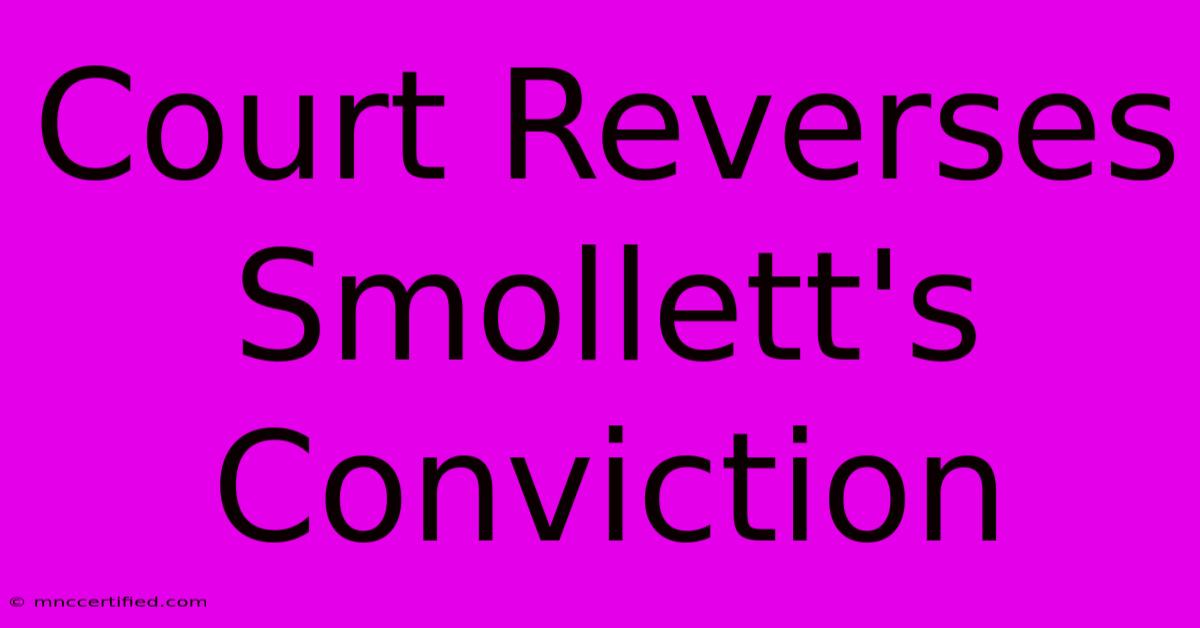Court Reverses Smollett's Conviction

Table of Contents
Court Reverses Jussie Smollett's Conviction: A Deep Dive into the Case and its Implications
The legal saga surrounding Jussie Smollett took another dramatic turn with the reversal of his conviction for staging a hate crime. This decision has sent shockwaves through the legal community and reignited public debate about the complexities of justice, media narratives, and the handling of high-profile cases. This article delves into the details of the case, the reasons behind the court's reversal, and the broader implications of this landmark ruling.
Understanding the Original Case: Smollett's Accusation and Conviction
In 2019, Jussie Smollett, then a star on the television show Empire, reported a brutal hate crime attack in Chicago. He claimed he was assaulted by two men who shouted racial and homophobic slurs, poured bleach on him, and placed a noose around his neck. The incident sparked widespread outrage and fueled national conversations about race and hate crimes.
However, the subsequent investigation revealed a shocking twist. Police determined Smollett had orchestrated the entire event, paying two brothers to stage the attack. He was subsequently charged with disorderly conduct, a felony. After a highly publicized trial, Smollett was found guilty on five of the six counts against him, leading to a sentence of 150 days in jail and substantial fines. This conviction was widely reported across numerous media outlets, solidifying the narrative of a deliberate hoax.
The Reversal: Key Reasons and Legal Arguments
The recent reversal of Smollett's conviction hinges on several crucial factors. The appellate court focused on several key arguments:
-
Insufficient Evidence: The court questioned the sufficiency of the evidence presented at the original trial, suggesting it did not definitively prove Smollett's guilt beyond a reasonable doubt. This crucial aspect of the appeals process highlighted inconsistencies and limitations in the prosecution's case.
-
Prosecutorial Misconduct: Allegations of prosecutorial misconduct played a significant role in the reversal. The court scrutinized actions taken by the prosecution during the trial, potentially influencing the jury's verdict and raising concerns about a fair trial. The specifics of this misconduct are currently under public scrutiny and further investigation.
-
Jury Selection Issues: Potential issues surrounding the jury selection process were also examined. While not explicitly cited as the sole reason for the reversal, concerns about impartiality and the potential influence of pretrial publicity were considered within the broader context of the case.
The Implications of the Reversal: Legal and Societal Impacts
The reversal of Smollett's conviction has significant ramifications, impacting both the legal landscape and broader societal perceptions:
-
Impact on Future Cases: This decision might influence the prosecution of similar cases in the future, raising questions about the burden of proof in complex and high-profile incidents. It emphasizes the importance of robust evidence and due process in the judicial system.
-
Public Trust and Media Coverage: The Smollett case highlights the challenges of navigating media coverage in high-profile cases. The initial wave of public outrage, fuelled by news reports, contrasted sharply with later revelations about the case's true nature. This highlights the critical need for responsible reporting and avoiding premature conclusions.
-
Re-evaluation of Hate Crime Allegations: The case’s complexities force a critical re-evaluation of how allegations of hate crimes are investigated and prosecuted. The need for thorough and impartial investigations, ensuring due process, is paramount to maintaining public trust in the judicial system.
What Happens Next? The Future of the Jussie Smollett Case
The reversal of Smollett's conviction does not necessarily mean an end to the legal proceedings. The prosecution may choose to appeal the decision to a higher court, or decide not to pursue the case further. This uncertainty adds another layer of complexity to an already multifaceted situation. Regardless of the path forward, the Smollett case will undoubtedly continue to generate discussion and debate about the intersection of law, media, and public perception.
Keywords: Jussie Smollett, conviction reversal, hate crime, appellate court, legal implications, prosecutorial misconduct, media coverage, public perception, due process, burden of proof, judicial system, Chicago, disorderly conduct, felony, Empire.
Off-Page SEO Strategies:
- Link Building: Secure links from reputable news outlets, legal blogs, and relevant websites discussing the case.
- Social Media Engagement: Share the article on relevant social media platforms, engaging with users and participating in discussions related to the case.
- Guest Blogging: Write guest posts on other blogs discussing legal topics or current events, including a link to this article.
This article provides a comprehensive overview of the Jussie Smollett case and its reversal. It aims to inform readers about the legal details, societal impacts, and the future implications of this significant legal development. Remember to always consult multiple sources and engage in critical analysis when evaluating information about complex legal cases.

Thank you for visiting our website wich cover about Court Reverses Smollett's Conviction. We hope the information provided has been useful to you. Feel free to contact us if you have any questions or need further assistance. See you next time and dont miss to bookmark.
Featured Posts
-
Adani Faces Bribery Charges In India
Nov 22, 2024
-
Empire Fire And Marine Insurance
Nov 22, 2024
-
Icc Warrants Netanyahu Gallant Targeted
Nov 22, 2024
-
No 25 Princeton Faces Penn Cornell
Nov 22, 2024
-
Cheapest Sr22 Insurance In Maine
Nov 22, 2024